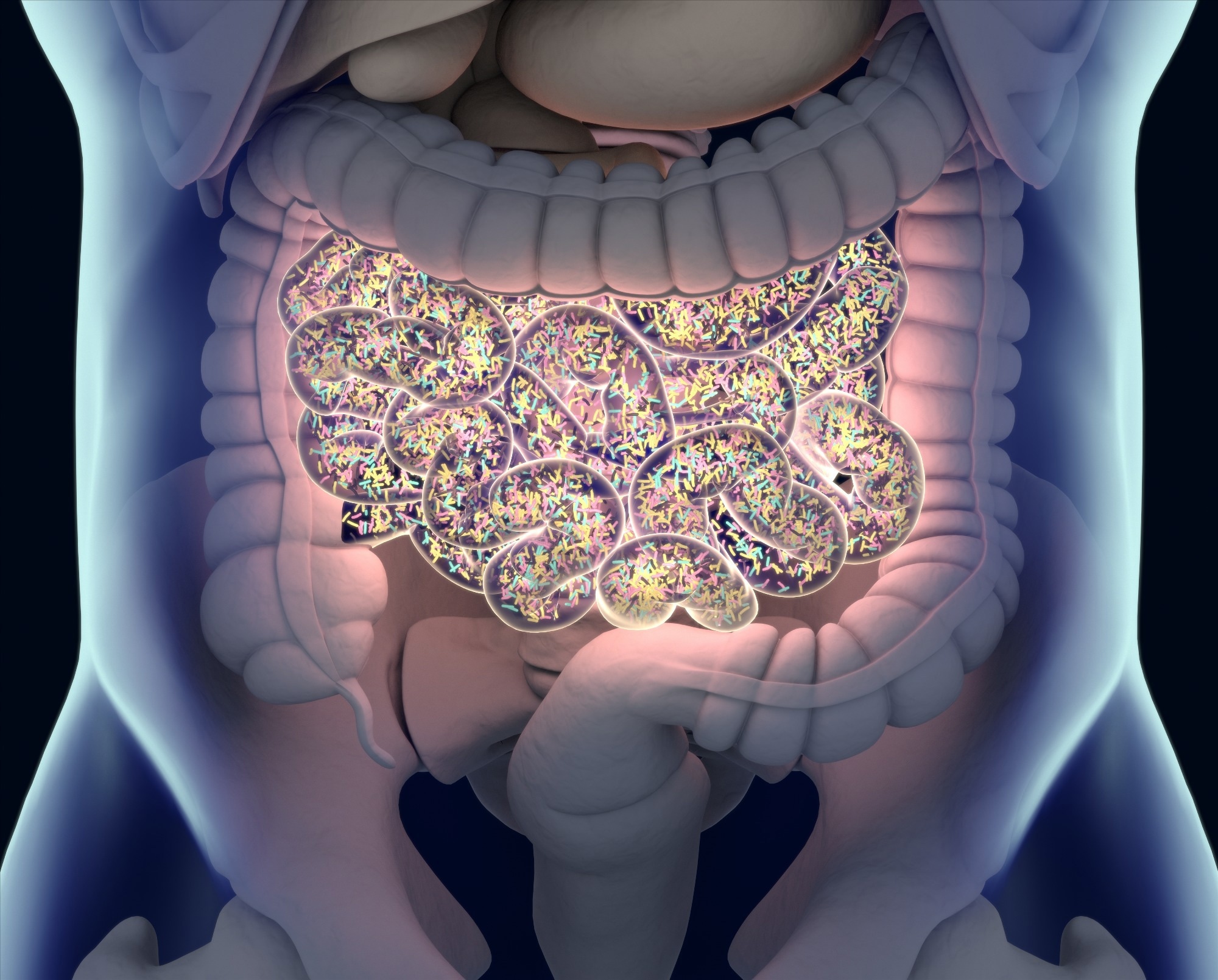Reviewed by Lauren HardakerSep 12 2025
Supporting the abundance and well-being of beneficial gut bacteria has become a profitable pursuit, fuelled by supplements and fad diets that promise to be the secret to gut health. Researchers from the University of Sydney’s Faculty of Medicine and Health and Faculty of Science are now calling into question the notion that nutrition alone determines gut health, as they have shown that genes actively shape bacterial populations.
 Image credit: Anatomy Image/Shutterstock.com
Image credit: Anatomy Image/Shutterstock.com
The researchers in Sydney have discovered a promising new weapon in the fight against obesity and diabetes.
After decades of research linking the gut microbiome to almost every chronic disease, it may seem like we’re all being held hostage by the bugs that live inside us.
Dr. Stewart Masson, Study First Author, Charles Perkins Centre
“While gut microbes certainly influence everything from diabetes to depression, this study has revealed that our bodies aren’t just passive hosts,” added Dr. Stewart Masson.
The scientists discovered that mice carrying certain genes generated alpha-defensins, natural peptides or tiny proteins that function as microbiome gardeners. These proteins influence which gut bugs flourish and eliminate undesirable bacteria. Interestingly, humans also have alpha-defensin peptides, which the researchers think are very important for human health.
Insulin resistance, a major contributor to type 2 diabetes and heart disease, was far less likely to develop in these mice, which also had better microbiomes.
Our work suggests that our DNA actively works to shape a healthy gut microbiome, and these microbial-shaping peptides could one day, if harnessed, become a new weapon against obesity and diabetes.
David James, Professor and Joint Interim Academic Director, Charles Perkins Centre
Insulin Resistance, Chronic Disease, and Diet: Genes Play an Important Role
When the researchers discovered that certain animals that were less likely to develop insulin resistance possessed genes that altered the synthesis of defensin peptides in intestinal lining cells, they began investigating the genetic impacts of insulin resistance in mice.
Dr. Masson added, “Defensin peptides are present in a wide range of organisms, from plants to mice and humans, and are thought to be the earliest precursor to an immune system. Mice and humans seem to have evolved many defensin genes, each making a different peptide. It is thought that this diversity allows our immune system to fend off a wide range of attackers.”
Mice with higher levels of alpha-defensins were shown to be healthier than those with lower levels.
The researchers then synthesized the defensin peptides in the lab and administered them to mice lacking the genes to test these findings. According to the research, this shielded the mice from the harmful consequences of eating an unhealthy diet.
“These initial findings are exciting because they show we can potentially use peptides to address chronic diseases from diabetes to obesity to depression – all of which have been linked to the health of our microbiome over decades of research,” added Dr. Masson.
Critically, while certain genetic mouse strains benefited from the defensin peptides, others did not and actually suffered more.
“This shows the importance of ‘personalized medicine’, or tailoring treatments to complement the genes of individuals rather than taking a one-size-fits-all approach to medications. We need to establish how different individuals and microbiomes react to the same treatments, whether they be defensin peptides or common medications already in use,” further added Dr. Masson.
How Beneficial Bacteria Can Boost Wellbeing
Dr. Masson stated that the team is now aiming to build on their study and examine its relevance to human health.
“We’re looking to measure these peptides in humans. In particular, measuring them in the gut and looking at the relationship with metabolic health and the microbiome. I'm also interested in defensins beyond diabetes. We know the microbiome is involved in many chronic diseases like cancer; I suspect defensins could play a role in this field,” added Dr. Masson.
Professor James stated that this demonstrates the potential power of precision medicine.
“Our work clearly shows how manipulating the gut microbiome with these peptides benefits some but not others. This highlights both the potential of precision medicine and the potential dangers of trying to alter our gut microbiome, such as with supplements or even fad diets, before we know more about how our bodies maintain healthy microbiomes unique to each of us. We are at the foothills of precision medicine, and the picture looks promising, but we have a long way to go,” added James.
Source:
Journal reference:
Masson, S. W. C., et al. (2025) Genetic variance in the murine defensin locus modulates glucose homeostasis. EMBO J. doi.org/10.1038/s44318-025-00555-5.